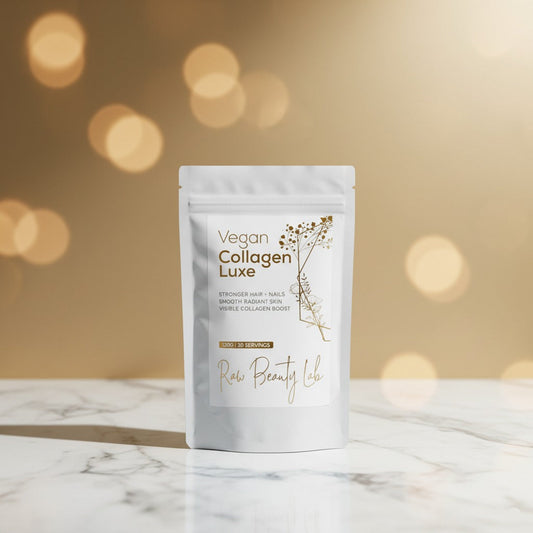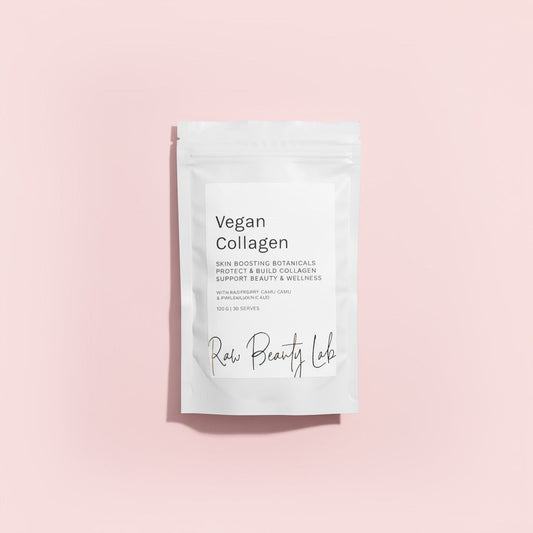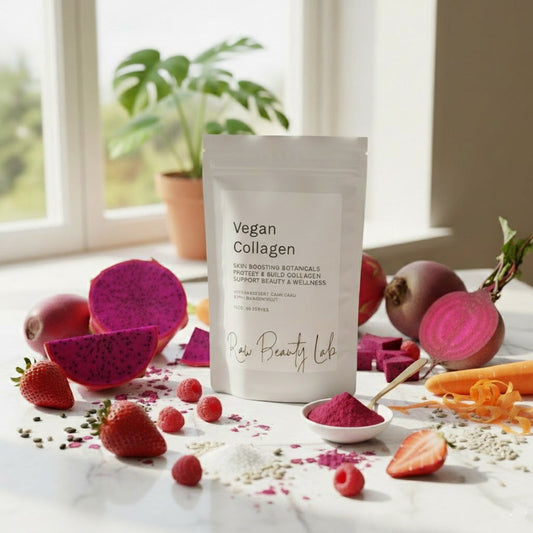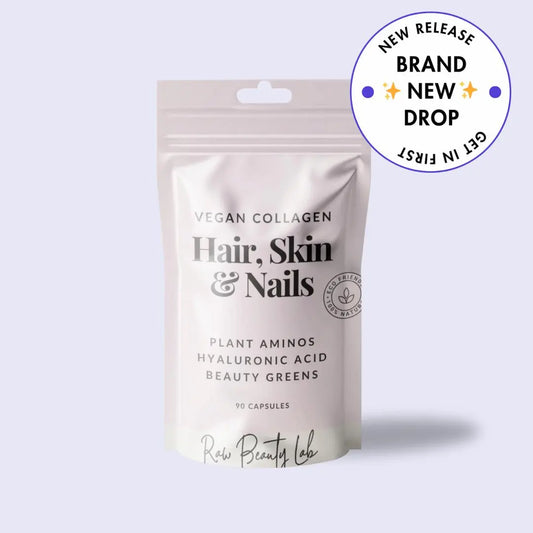Table of contents
You seem to see collagen products everywhere at the moment - from pills to powders and even drinks for on-the-go. We did our homework and spoke to the scientific community to understand our options. We're happy to say its a win for plants, with over 30 years of scientific research conclusively proving that vegan collagen and plant-based builders are more effective than animal-based products at firming, toning and smoothing skin.
Article at a glance:
- Collagen is the most abundant protein in your body. It’s what gives your skin its plump, firm and youthful appearance - so yeah, it’s pretty important.
- You body naturally produces collagen every day but over time this process slows down which is when your skin starts to become dry, form fine lines and lose its youthfulness. Specific types of collagen supplements can help maintain your body’s ability to produce collagen naturally.
- Whilst animal-sources of collagen are the most common type of supplement, there is a lack of scientific evidence to suggest it can be properly absorbed by the skin to have any meaningful impact.
- Plant-based supplements, which are high in Vitamin C, have been scientifically proven again and again to support collagen production directly in the skin itself.
- Plant-based collagen supplements have been scientifically proven by well-regarded medical journals to reduce wrinkles, improve skin tone and elasticity as well as increase skin hydration.
What is collagen and why is it important?
There is a reason why the beauty industry is so obsessed with collagen - its the most abundant protein in our skin and makes up around 75%-80% of our skin's structure. Many dermatologists call it the 'structure for skin's youthfulness".
Along with elastin (what gives skin its elasticity), collagen is found in the lower layers of our skin and provides the volume that keeps skin looking plump and keeps lines at bay. Collagen is also found in hair, bones, tendons, ligaments, muscle, and blood vessels.
Although our bodies make new collagen every day, the research tells us that from the age of 25 we lose more collagen than we produce. On average we'll lose around 1.5% of our collagen each year, which is when we start to see fine lines, wrinkles, sagging skin and weakened joints - not cool.
However decades of scientific research have proven that there is much we can do now to support our body's production of collagen for a visible impact on the signs of ageing.

Why we don't believe in animal based collagen supplements
Because we break down more collagen than we make as we get older, the experts say that by consuming collagen drinks or supplements we may be able to improve skin tone, boost elasticity and smooth fine lines.
The important thing to remember is that not all collagen supplements are created equal. The most popular collagen supplements in the UK at the moment, are animal based. However there is limited evidence to suggest that collagen you consume (i.e. collagen from animals) will actually reach your skin. Many experts believe that the majority of animal-derived collagen may be digested before it can get to work and have any real beneficial impact on your skin.
Cue the Vegan Collagen alternatives.. These non-animal supplements may actually have a bigger impact on skin tone, texture, fine lines and radiance. They are rich in plant-based antioxidants, flavenoids, polyphenols, anthocyanins and vitamins and essentially provide your skin with the right building blocks and support so that it can produce its own collagen.
How do plants help your body produce collagen?
Let's take a look at the science first. The Gold Standard for understanding if food supplement claims are legit or not can be found via the EU's Register of Nutrition and Health Claims. Interestingly, despite the popularity of animal-based collagen supplements there is no evidence within the EU register that animal-based collagen has any real benefit on skin. In comparison, plant-based alternatives have been proven to support collagen. The European Union's register has validated and proven that specific plant-based nutrients can support collagen formation from within your skin itself as well as support overall skin health along with its ability to self-repair.
So can we really rely on plants to provide us with a 'fountain of youth' type solution? Decades of scientific research says yes, and in fact the benefits may be far more wide reaching than just skin deep. Plant-based compounds have the power to give us not just a more youthful, toned complexion but can also help us age healthily by supporting our overall immune system, energy levels and even heart health.
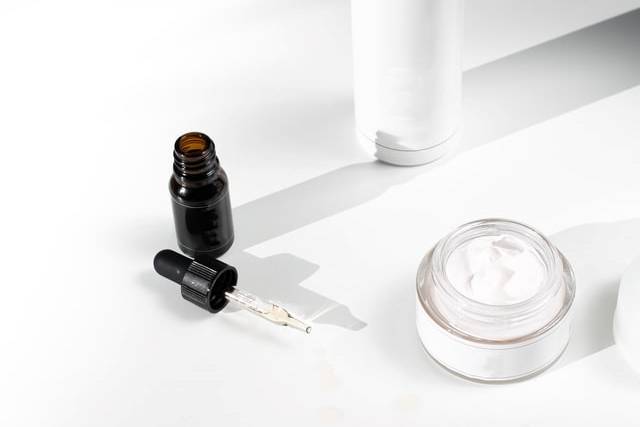
Why not just use a collagen-boosting cream?
Your skin consists of two main layers - the thin outer epidermis and the much thicker lower dermis. Creams and serums you apply on your skin are typically unable to penetrate to your dermis as their molecular weight is typically too high. This is a problem as over 70% of your collagen and skin's support structures are found in your dermis and serve as the foundation of your youthfulness. The best way to reach your dermis is from within via good nutrition or beauty supplements.
The major benefit of plant-based collagen products is that they are scientifically formulated to both reach AND support the lower layers of your skin to have far reaching impacts on your skin's firmness, tone and youthfulness. They are also the perfect compliment to your existing topical skincare regime and can help boost your visible results.
Here are just 7 of the incredible benefits of plants in boosting our collagen from within
1. Target wrinkles where they first form
There is growing evidence to suggest that wrinkles first begin to form in your skin's dermis (the lower layer of your skin), rather than the outermost visible layer. Given that topical skincare can't reach this layer of your skin, plant-based collagen supplements can do what beauty creams can't - combat wrinkles where they first begin. This makes dietary supplementation a key component of any anti-ageing routine. A study with over 4000 women aged between 40 and 74 years of age saw a significant improvement in the appearance of wrinkles and as well as overall skin health from consuming plant-based antioxidants.
2. Repair and rejuvenate skin with plants
If you think you're skin isn't looking its best, don't despair! Your skin has the incredible ability to be able to repair itself and clinical studies have also shown the power of dietary nutrition in regenerating and renewing skin for a visibly younger looking complexion. A separate 2017 study found that particular plant based antioxidants can help lessen wrinkle depth and smooth fine lines by supporting both collagen production and aiding in skin repair.

3. Get firmer, more toned skin
Your lifestyle choices can have a negative impact on your skin. Too much sun exposure, sugar or alcohol can actually accelerate collagen loss and degrade collagen faster than the natural ageing process.
Supporting your skin with plant-based antioxidants can help protect collagen from degradation and free radical damage from lifestyle related factors. These antioxidants have also been shown to help firm and tone skin. A 2016 study with individuals aged between 40 and 65 found tighter skin in individuals who had a higher intake of fruits and vegetables.
4. Improve skin elasticity and youthfulness
Ever wondered what makes a face look youthful? You got it- its collagen. Collagen essentially is the scaffold which what provides your complexion with its fullness and plumpness - what we see as youthful.
Supporting your collagen within can help improve skin plumpness which also helps to smooth fine lines and combat skin sagging.
5. Boost skin moisture for more radiant skin
One of the side effects of getting older (partly caused by collagen loss) is dry skin. There is evidence to suggest that dry skin may also exacerbate the appearance of fine lines and wrinkles. A clinical study with over 3500 woman found that the consumption of plant-based antioxidants led to more hydrated skin. Lab studies have also shown the that antioxidants like vitamin C can actually reduce moisture loss from skin as well as improving skin smoothness - yes please!

6. Support healthy hair and nails
Supporting collagen production can help grow and strengthen hair, prevent thinning and potentially even postpone greying through its antioxidant activity.
Research shows that free radicals may damage hair follicles. Since your body’s defence against free radicals decreases with aging, as we get older our hair becomes more susceptible to damage and the cells that produce the melanin pigment that gives our hair its colour naturally begin to die. In addition, free radicals that result from poor diet, stress, and environmental pollutants can also damage melanin-creating cells.
Boosting your antioxidant intake alongside supporting collagen production may help keep hair strong whilst also protecting melanin-creating cells to keep hair looking youthful.
7. Support joints
Your blood vessels, bones and cartilage all consist of collagen. Supporting your collagen production with a plant-based source may actually support cartilage repair and improve antioxidant activity within the body to support healthy bones and joints.

How long does it take to see results from taking collagen?
Supporting your collagen from within can work wonders to improve skin. Some people report results as early as a week but typically results become visible after 4 weeks of continuous use.
Throughout your life, your skin will change constantly, for better (or for worse). Your skin has its own cycle and regenerates itself approximately every 27 days which is when you will begin to see the impact of a supplement. As the impact happens at the cellular level, you'll tend to see optimal results between 12-16 weeks of continuous use.
In a 12 week trial of a vitamin C enriched supplement, collagen increased by 22.8%, skin hydration by 30.2% and skin elasticity by 64.3%.
Other ways to boost collagen
If you're not keen on using a beauty supplement you should look to include more fruits and vegetables in your diet to help support your collagen. Nutritionists recommend "eating the rainbow". Brightly coloured fruits and vegetables contain powerful antioxidants including polyphenols, ellagic acid, and anthocyanins which can have a significant impact on not just the visible signs of ageing over time but also help support your wellness.


